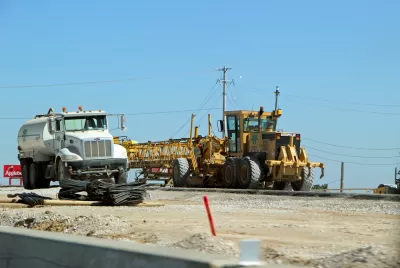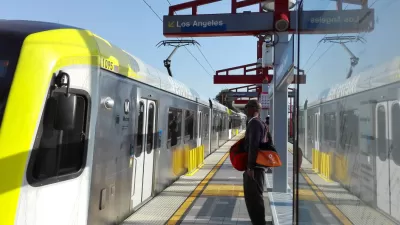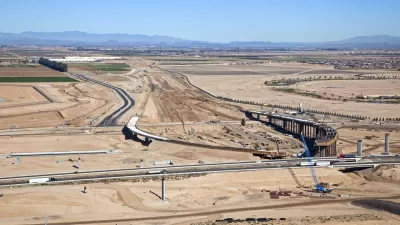U.S. transit projects have a much harder time getting environmental approval than road projects, perpetuating the dominance of cars in U.S. transportation policy.

Henry Grabar questions the logic of environmental review processes that delay transit projects and, counterintuitively, ease the way forward for highway construction. "[O]n the eve of a once-in-a-generation federal investment in infrastructure," Grabar writes, "the environmental review process for big projects is totally unfit for the task at hand. Transportation is the country’s largest source of carbon emissions, but ideas that aim to reduce dependence on planes, cars, and trucks have even more trouble gaining environmental approval than highways."
An "analysis of 180 projects here and abroad found that U.S. projects cost 50 percent more and take 18 months longer to conclude than similar projects abroad," in part because "American transit builders use environmental reviews as an opportunity to plan routes and engage with the community, transforming what might be a cut-and-dried assessment into an interminable back-and-forth."
Meanwhile, "the ease with which highways get funded and constructed, observes Joe Cortright at the think tank City Observatory in Portland, Oregon, makes it harder in turn for transit to prove its success" and helps, as Grabar puts it, "perpetuate the dominance of ice cap–melting SUVs in American transportation policy." A nationwide policy similar to California's 2020 decision to "exempt sustainable local transportation projects from undergoing analysis under the California Environmental Quality Act for the next four years" could alleviate the problem and give transit projects a fighting chance.
FULL STORY: The Perverse Reason It’s Easier to Build New Highways Than New Subways

Alabama: Trump Terminates Settlements for Black Communities Harmed By Raw Sewage
Trump deemed the landmark civil rights agreement “illegal DEI and environmental justice policy.”

Study: Maui’s Plan to Convert Vacation Rentals to Long-Term Housing Could Cause Nearly $1 Billion Economic Loss
The plan would reduce visitor accommodation by 25% resulting in 1,900 jobs lost.

Planetizen Federal Action Tracker
A weekly monitor of how Trump’s orders and actions are impacting planners and planning in America.

Wind Energy on the Rise Despite Federal Policy Reversal
The Trump administration is revoking federal support for renewable energy, but demand for new projects continues unabated.

Passengers Flock to Caltrain After Electrification
The new electric trains are running faster and more reliably, leading to strong ridership growth on the Bay Area rail system.

Texas Churches Rally Behind ‘Yes in God’s Back Yard’ Legislation
Religious leaders want the state to reduce zoning regulations to streamline leasing church-owned land to housing developers.
Urban Design for Planners 1: Software Tools
This six-course series explores essential urban design concepts using open source software and equips planners with the tools they need to participate fully in the urban design process.
Planning for Universal Design
Learn the tools for implementing Universal Design in planning regulations.
Caltrans
Smith Gee Studio
Institute for Housing and Urban Development Studies (IHS)
City of Grandview
Harvard GSD Executive Education
Toledo-Lucas County Plan Commissions
Salt Lake City
NYU Wagner Graduate School of Public Service





























